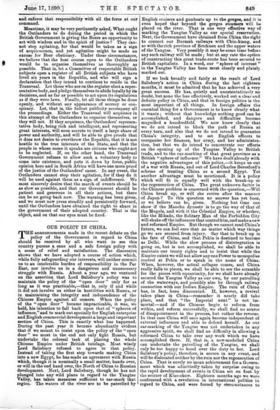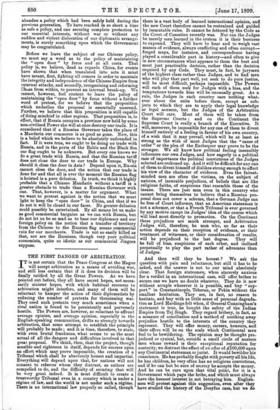OUR POLICY IN CHINA. T HE announcements made in the recent
debate on the policy of the Government in regard to China should be received by all who want to see this country pursue a sane and a safe foreign policy with a sense of relief and satisfaction. The discussion shows that we have adopted a course of action which, while fully safeguarding our interests, will neither commit us to an intolerable burden of responsibility in the Far East, nor involve us in a dangerous and unnecessary struggle with Russia. About a year ago, we ventured on the assertion that Lord Salisbury's policy was to maintain the policy of the "open door" only for as long as it was practicable,—that is, only if and while it did not involve us either in hostilities with Russia, or in maintaining the integrity and independence of the Chinese Empire against all comers. When the policy of the " open door " became impracticable, it was, we held, his intention to fall back upon that of " spheres of influence." and to mark out specially for English enterprise and English commercial development a large and important section of China. This is exactly what has happened. During the past year it became abundantly evident that if we meant to insist upon the policy of the " open door" we must in the end not only fight Russia, but undertake the colossal task of placing the whole Chinese Empire under British tutelage. Most wisely Lord Salisbury refused to agree to that policy. Instead of taking the first step towards making China into a new Egypt, he has made an agreement with Russia which, though it is nominally a small matter, hands over, or will in the end hand over, the North of China to Russian development Next, Lord Salisbury, though he has not plunged into any wild plans in regard to the Yangtse Valley, has taken measures sufficient to ear-mark that region. The waters of the river are to be patrolled by English cruisers and gunboats up to the gorges, and it is even hoped that beyond the gorges steamers will be placed on the river. That is one very effective way of marking the Yangtse Valley as our special reservation. Next, the Government have obtained from China the right to connect our Burmah railways with Chin-kiang, and so with the rich province of Setchuen and the upper waters of the Yangtse. Very possibly it may be some time befora any such railway will be made ; but at any rate the option of constructing this great trade-route has been secured to British capitalists. In a word, our " sphere of interest " in the Yangtse Valley has been most clearly and plainI3 marked out.
If we look broadly and fairly at the result of Lord Salisbury's action in China during the last eighteen months, it must be admitted that he has achieved a very great success. He has, quietly and unostentatiously no doubt, but none the less effectively, worked out a clear and definite policy in China, and that in foreign politics is the most important of all things. In foreign affairs the essential thing for a Government is to know clearly what it wants • without that knowledge nothing good can be accomplished, and dangers and difficulties become magnified a hundredfold. We now know clearly that we do not intend to block the path of Russia at every turn, and also that we do not intend to guarantee China's integrity, and to set English officers to reorganise her finances, her army, and her administra- tion, but that we do intend to concentrate our efforts on the opening up of the Yangtse Valley to British trade, and to the ear-marking of that great province as a British " sphere of influence." We have dealt already with the negative advantages of this policy,—it keeps us out of a war with Russia, and out of Lord Charles Beresford's scheme of treating China as a second Egypt. Yet another advantage must be mentioned. It is a policy which will fit in equally well with the break-up or the regeneration of China. The great unknown factor in the Chinese problem is concerned with the question,—Will China break up, or will she revive after the manner of Japan ? To this question no answer has yet been, or we believe can be, given. Nothing but time can show if the Manchu dynasty is to go the way of that'Of the Moguls, and with it the Celestial Empire, or whether, like the Mikado, the Solitary Man of the Forbidden City will shake off the influences that controlhim, and make a new and reformed Empire. But though we cannot read China's future, we can feel sure that no matter which way things go we are secured from injury. Say that to break up is the fate of China, and that Pekin is destined to become as Delhi. While the slow process of disintegration is going on, but is not accomplished, we shall be able to maintain our treaty rights and to insist that while the Empire exists we will not allow any one Power to monopolise control at Pekin or to speak in the name of China. When, however, the actual collapse comes, and China really falls to pieces, we shall be able to see the scramble for the pieces with equanimity, for we shall have already secured the Yangtse Valley as our own, by our patrolling 13 of the waterways, and possibly also by through railway connection with our Indian Empire. The ruin of China has, in fact, been discounted. If, however, a revival takes place in China—remember it nearly did take place, and that "the Imperial aunt" is not im- mortal—and if the Chinese begin to reform from within, and reform successfully, we shall find no source of disappointment in the process, but rather the reverse. In that case China will once again become independent of external influences and able to defend herself. As our ear-marking of the Yangtse was not undertaken in any aggressive spirit, we shall find no difficulty in allowing a reformed China to take over any work which we have accomplished there. If, that is, a new-modelled China can undertake the patrolling of the Yangtse, we shall only be too happy to hand over the duty to her. Lord Salisbury's policy, therefore, is secure in any event, and will be dislocated neither by the ruin nor the regeneration of China. That is surely no mean achievement for a Govern- ment which was admittedly taken by surprise owing to the rapid development of events in China set on foot by the seizure of Kiao-chow. Eighteen months ago we were confronted with a revolution in international politics in regard to China, and were forced by circumstances to abandon a policy which had been safely held during the previous generation. To have reached in so short a time as safe a policy, and one securing complete protection to our essential interests, without war or without any sudden and violent dislocation of our diplomatic arrange- ments, is surely something upon which the Government may be congratulated.
Before we leave the subject of our Chinese policy, we must say a word as to the policy of maintaining the " open door " by force and at all costs. Tbat policy is, we believe, dead as regards China, for events have shown that when translated into acts it must have meant, first, fighting all corners in order to maintain the integrity and independence of the Chinese Empire from external attacks, and secondly, reorganising and reforming China from within, to prevent an internal break-up. We cannot, however, feel content to leave the policy of maintaining the "open door" by force without a further word of protest, for we believe that the proposition which underlies the proposal is essentially unsound. Further, we believe that this proposition is still capable of doing mischief in other regions. That proposition is, in effect, that if Russia occupies a province now held by some non-civilised Power she will at once destroy our trade. It is considered that if a Russian Governor takes the place of a Mandarin our commerce is as good as gone. Now, this is a belief which we believe to be absolutely unfounded in fact. If it were true, we ought to be doing no trade with Russia, and in the ports of the Baltic and the Black Sea our flag ought to be unknown. But every one knows we do a great trade with Russia, and that the Russian tariff does not close the door to our trade in Europe. Why should it close the door in Asia ? Depend upon it, Russia cannot close the door, and the notion that our trade is done for and that all is over the moment the Russian flag is hoisted is a pure delusion. In truth, we think it highly probable that a Chinese Mandarin without a tariff is a greater obstacle to trade than a Russian Governor with one. That, however, is a matter for argument. What we want to protest against is the notion that we must fight to keep the " open door" in China, and that if we do not it will be closed in our faces. No greater delusion could possibly be entertained. By all means let us make as good commercial bargains as we can with Russia, but do not let us be so mad as to base our diplomacy and our foreign policy on the notion that a transfer of territory from the Chinese to the Russian flag means commercial ruin for our merchants. Trade is not so easily killed as that, nor are the Russians, though very poor political economists, quite so idiotic as our commercial Jingoes suppose.







































 Previous page
Previous page